IDU: Harper's Worldwide Winning Network
Part 1: Coordination and collaboration helps right wing parties take and keep power

When Stephen Harper’s time as Prime Minister ended in 2015 with his party’s defeat, he didn’t stay in government long. By August of 2016, Harper had resigned his seat as a Calgary MP and started getting down to other business.
Harper’s infamous dedication to the long game was outlined in Paul Well’s biography of the PM, The Longer I’m Prime Minister. In a review for The Narwhal by Russel Blinch, the author wrote: “The very title of the book, The Longer I’m Prime Minister, refers to his plan to shift Canada to the right through small steps achieved over time and under the radar.” In a post-convoy, increasingly authoritarian Canada, it’s hard to argue with the success of Harper’s incrementalist approach. Wrote Blinch, “He wants to ‘re-legitimise’ the right and obliterate all traces of so-called leftish thinking.”
By 2018, Harper was confident enough that his long-term plans for Canada, and his consulting business, were in safe, loyal hands, leaving free to pursue bigger and better. In February of 2018, Harper was elected Chairman of the International Democratic Union (or IDU), succeeding John Key, former PM of New Zealand.
The official origin story has IDU formed in 1983, with founding members including Margaret Thatcher, George Bush Sr., and Jacques Chirac. The goal was “one strong voice” to promote “democracy and centre-right policies around the globe.” The founding declaration was signed by 19 parties.
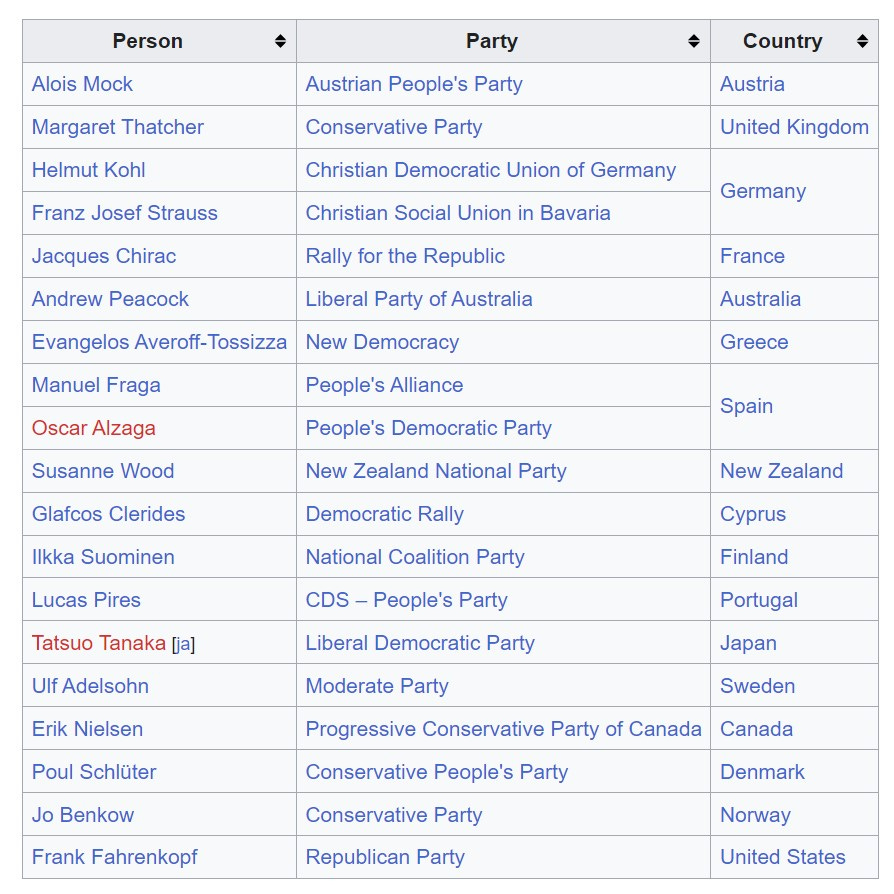
The minutes of the first meeting of IDU feature remarks from Dr. Alois Mock (of the Osterreichische Volkspartei in Austria and first Chairman of the IDU) which feature language and themes still used by libertarians and Koch-backed think tanks today - emphasizing personal freedom, and a push to reduce and eliminate regulations on business. (Added emphasis is mine.)
A society, where the principal task of government is to serve the individual - and not vice-versa - and to safeguard and promote his freedom. We believe that the socially-orientated market economy provides the best means of creating the wealth and material prosperity to meet the legitimate aspiration of each individual, and of tackling social evils such as inflation and unemployment. Equally we stress the moral commitments of such a society, in our support for the role of the family, and in our recognition of our social responsibilities towards the weak, by encouraging self-help and individual enterprise.
In the fields of welfare, taxation, enterprise, education and indeed for society in general, the IDU Member-Parties seek to shape systems whereby the efforts of ordinary individuals, their preferences, aspirations, skills, creativity and thirst for freedom, provide the motive forces for a better society. Liberty and prosperity through economic stability, growth and full employment cannot be established through more regulations and restrictions. They will be generated by the release of individual vigour and vitality in an open society.
While the organization highlights its shared principles, the tangible benefits for member parties are much more pragmatic. The value is in the ability to swap strategies, tactics, insights, messaging and networks. In short, they share successes and resources to help each other get elected.
From the IDU website, italics mine:
Through the IDU, member Parties can exchange policy ideas, assist each other to win the political argument, and to win elections.
The IDU also organises campaigning seminars for politicians and party workers. These involve exchanges of information on campaign technology, fund-raising techniques, opinion polling, advertising and campaign organisation. The IDU plays an essential role in enabling like-minded, centre-right parties to share experiences in order to achieve electoral success.
Though IDU features “democracy” in the name, a look at the members, especially those recently in government, indicates parties more engaged in achieving and protecting authoritarianism and corporatism than democracy.
Member parties include the Republican Party in the US, Hungary’s Fidesz party (Viktor Orban), Likud in Israel (Benjamin Netanyahu), the Tories in the UK, and of course the Conservative Party of Canada. (Brazil Union, the current IDU member party from Brazil, is the result of a merger between Bolsonaro’s Social Liberal party and Democrats, after Bolsonaro’s departure.)
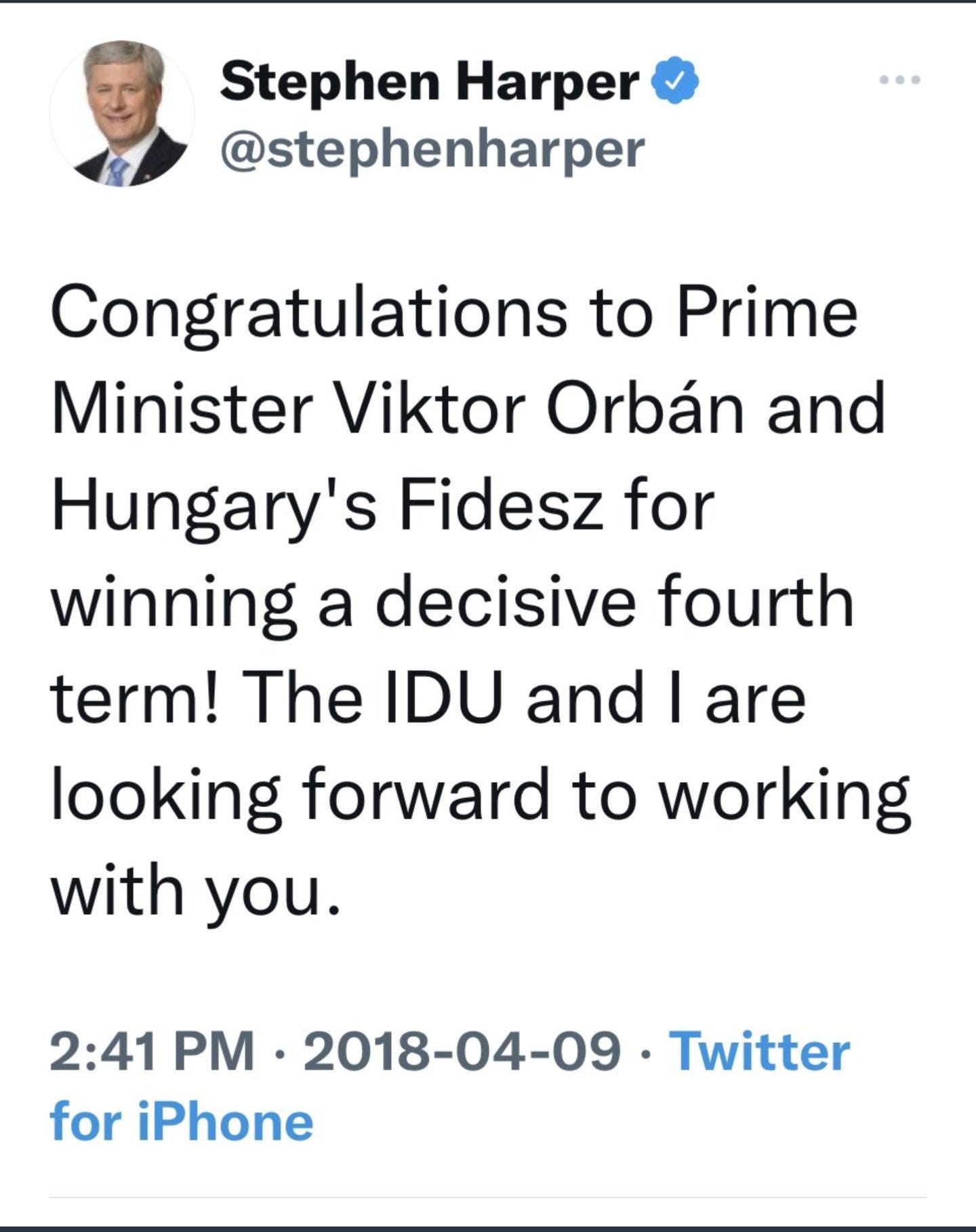
With Mr. Harper taking the reins in 2018, IDU members benefited from his infamous long view. Harper had credibility among member states, given what he had achieved in Canada. In a so-called liberal democracy, while he was Prime Minister, national interests had been sold to foreign entities under secret terms, corporate monopolies can freely lobby and donate to essentially write legislation in their own interests, the census had been cancelled, and relaxation of media ownership rules created a media ecosystem was controlled by telco monopolies, oligarchs and ideologically-aligned foreign interests. That these achievements help elect right wing parties by suppressing the vote was not lost on members. They wanted more of what Mr. Harper had achieved.
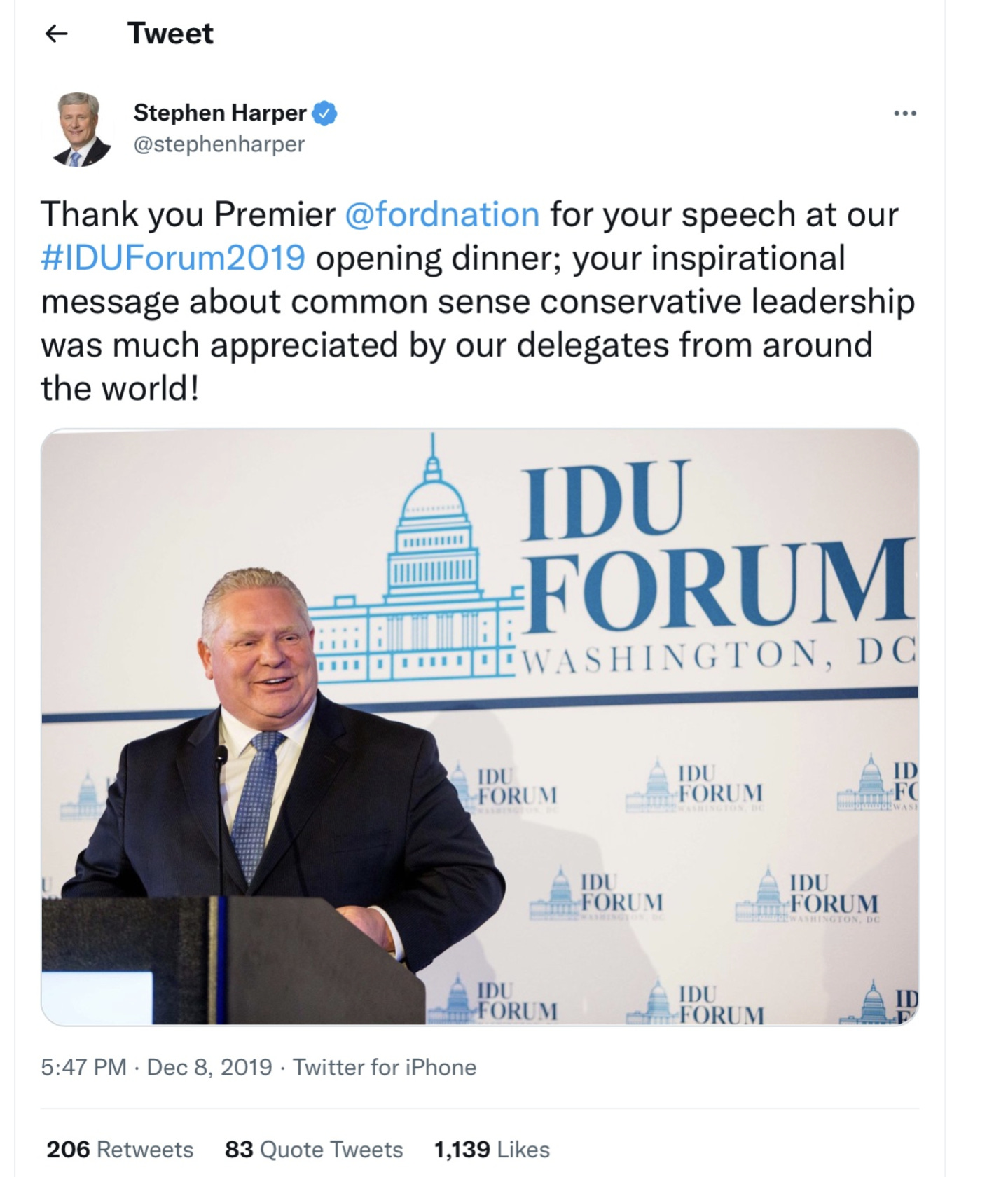
Indeed, Canadians are featured prominently and frequently at IDU events, sharing progress towards goals the members share, including commercialization and privatization of healthcare, reduction and removal of regulations, militarization and expansion of the police, and replacing public education systems with private and religious education.
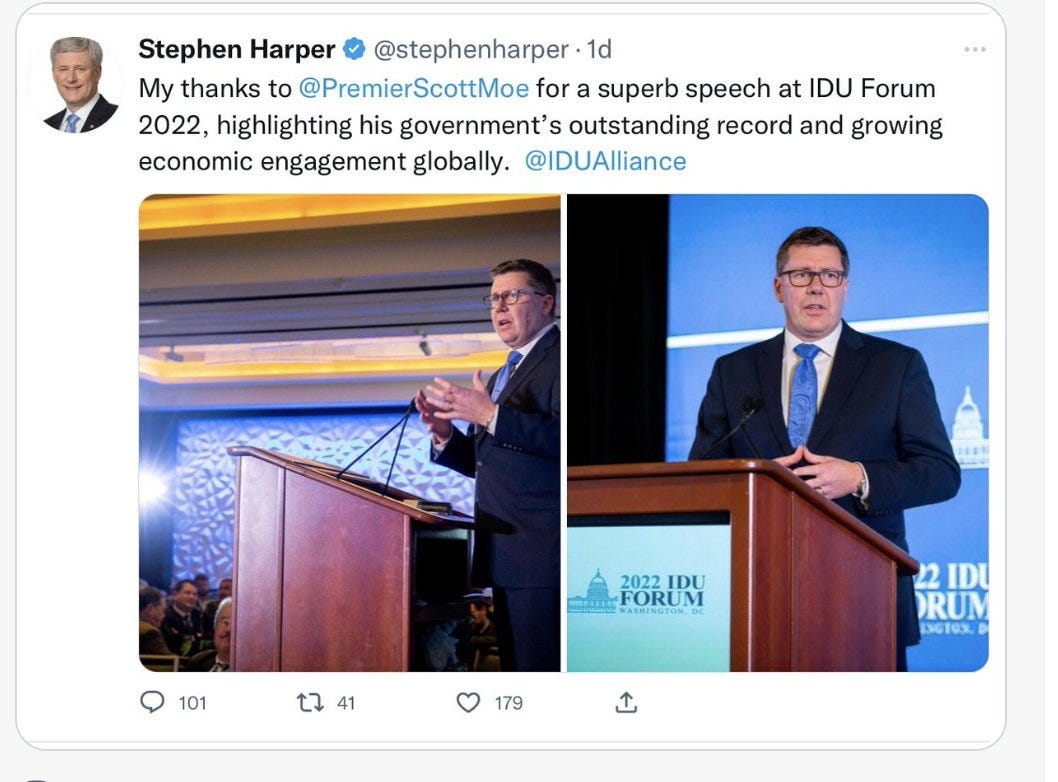
Canadian campaign operatives Canada Proud, lead by Jeff Ballingall, were featured prominently at IDU events in Harper’s first year, sharing the success of their tactics in Canada. Canada Proud, and its provincial offshoots, worked on Pierre Pollievre’s leadership campaign and helped elect Doug Ford in Ontario by using sophisticated fake grassroots campaigns, in coordination with aligned media, social media and pollsters. Their campaigns raise millions in legitimate and dark money by stirring up culture wars, and generate copious personal and socio-economic data on individual Canadians to support voter suppression efforts.
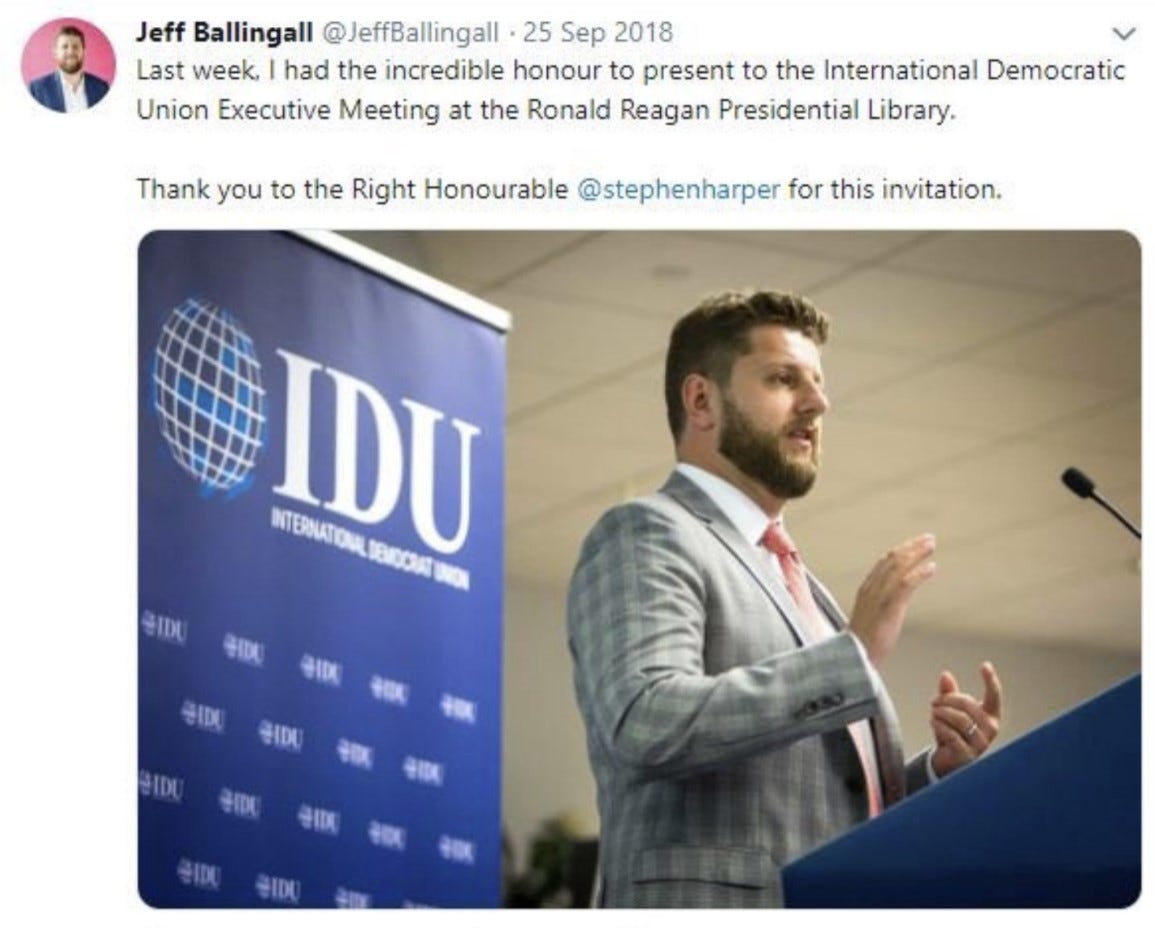
The alignment of interests and messaging between IDU parties can be seen most easily, from Canada, by looking at the UK government and Republicans in the US. The UK and Canada, for example, both have governments seeking to end the public healthcare system by introducing private, for-profit medicine. Similarities between the tactics and messaging being used by governments here and there are uncanny, and both countries used the cover of COVID to hasten their privatization efforts. Here, as in the UK, wealthy politicians and their family businesses would be huge beneficiaries of healthcare privatization, and healthcare unions have been weakened by compromising union leadership.
Via IDU, members can pull on expertise and partners from other members’ networks to advise on achieving the same goals. Koch-aligned Republicans have been successful undermining public education in the US, particularly in Republican states. States like Alabama, for example, have achieved a collapse of public education by using education funds for other purposes, and creating working environments to ensure public schools cannot be staffed. With similar ambitions, Conservative premiers like Doug Ford have tapped into winning strategies and strategists from Alabama and Arkansas.
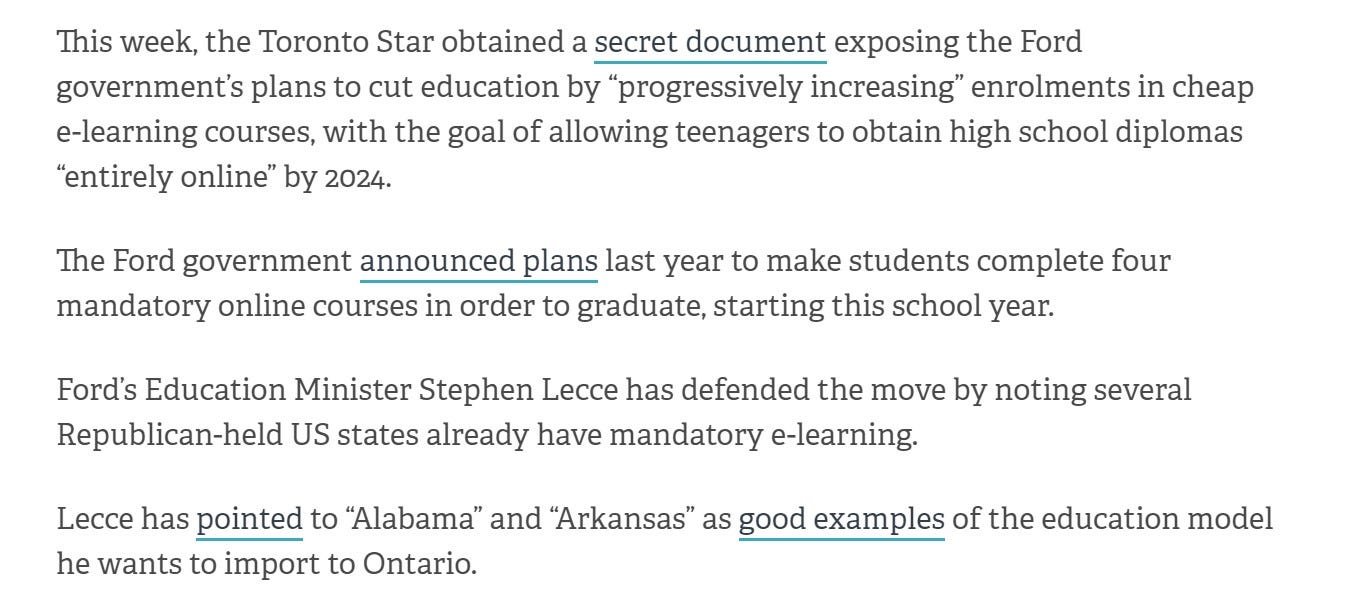
Another IDU “marker” in recent years has been violence and attempted coup when a member party leader loses to an opponent, where the houses of government are attacked under pretense of a “stolen election.” While the most memorable example was January 6th, 2022 in the US, it was echoed in Brazil (with similar tactics and messaging) after the defeat of Bolsonaro.
In Canada, though it was packaged as an anti-vaccine movement inexplicably led by commercial truckers, protestors on the ground and organizers called for the government to resign, amidst a occupation in the capital city that lasted for weeks and terrorized local residents. US and Russian money helped organize and sustain the “protest.” The “Freedom Convoy” kept national, provincial and local media and pundits busy for weeks in the key winter months leading up to the Ontario provincial election in early June, helping seal another term for Ford.
Coming in Part Two: COVID-19 and the IDU
By March 2020, with a pandemic declared, IDU members successfully coordinated an international gaslighting effort to undermine public health measures.
Corruptario by Jordan Roberts & Friends is a reader-supported publication. To receive new posts and support my work, consider becoming a free or paid subscriber.

